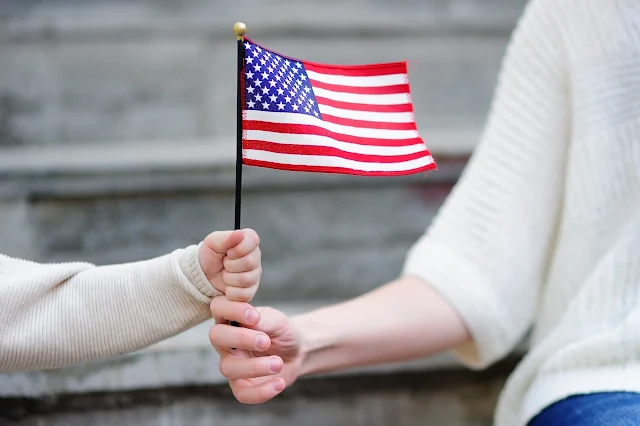For Military Children’s Health Month, I chatted with Debbie Nichols from the Military Children’s Collaborative Group. I was curious to hear about her personal experiences with seeing military kids serve alongside their parents. Debbie pulls from a lot of firsthand knowledge on this topic. When her daughter deployed, Debbie became the primary caregiver to her 2 granddaughters—and thus became a “deployed grandma.” Through supporting her daughter and grandchildren, Debbie saw a need to better help and honor military kids for their silent sacrifices and service. Here’s her story.
Tell us about yourself.
 Debbie: I’m married with 2 children and 4 grandchildren. In 2008,
our daughter, who serves in the Air Force, received orders to deploy to
Afghanistan. She was a single parent, so my husband, Alan, and I became
guardians to our daughter’s two children. At that time, Bailey was 6 years old
and Ivie was 10 years old.
Debbie: I’m married with 2 children and 4 grandchildren. In 2008,
our daughter, who serves in the Air Force, received orders to deploy to
Afghanistan. She was a single parent, so my husband, Alan, and I became
guardians to our daughter’s two children. At that time, Bailey was 6 years old
and Ivie was 10 years old.
Alan and I had 30 days to
prepare before moving the children out-of-state and into our home. We were
working “empty nesters” and had to change our work schedules. We enrolled the
children in a school that no military child had ever attended. We had no
support, and the school was uneducated on how to support our grandchildren
during their mother’s deployment. We learned quickly about separation and how
to deal with many challenges. When our daughter returned, the most difficult
challenge we faced was how to help her reconnect with her children. This
experience changed my life!
As a result of what I learned
from those experiences, I felt I had to do something. I wrote a book and
started a blog site to help other families facing what we faced. My
granddaughters and I began working together. We wrote a second book, which they
primarily authored. And we spoke at military family events, sharing what we
learned and providing tips. Then I founded the nonprofit Military Children’s
Collaborative Group, which focuses on addressing the needs of all children
connected to the military.
What was it like for you to quickly become the primary caretaker to
your young granddaughters?
Debbie: We became our granddaughters’ legal guardians too. It was
the biggest challenge of my life—yet the most rewarding. The challenge was
taking on the guardian role vs. being a fun grandmother. I dealt with having to
discipline the children, teaching them how to adjust to our community, helping
them with schoolwork, worrying about their well-being, supporting them while
their mother was in a war zone, and having my own concern for my daughter’s
safety. In the meanwhile, our friends, family, and employers didn’t know how to
support us.
My husband and I got to really
know our granddaughters inside and out. Prior to deployment, we only saw them
once or twice a year due to where they lived. We learned how to face adversity
together, communicate our concerns, and build unique bonds. To this day, our
granddaughters still share any concerns they face. They tell others that my
husband and I are their second parents!
During Military Children’s Health Month,
HPRC is exploring how “military kids serve too.” What does that phrase mean to
you?
Debbie: I believe military kids silently serve our country each and
every day. They support their parents and/or loved ones’ military obligations,
knowing they can be in harm’s way at any time. They have patriotic pride even
when they have to make personal sacrifices. They show bravery when they face
moving, going to a new school, and not having their parent around to celebrate
important moments due to a military obligation. Many of their peers don’t
understand the personal sacrifices they make.
How do you think your granddaughters were impacted by their mom’s time
in the Air Force?
Debbie: My daughter still serves in the Air Force. My
granddaughters said the most difficult times being military children included being
separated from their mother, moving, having to make new friends in school, and attending
after-school activities.
How do you think leaving her children with you impacted your daughter
when she deployed?
 Debbie: My
daughter told me it was so difficult leaving her children, but knowing my
husband and I were caring for them made it bearable. She knew she had a happy
childhood and her children were in good hands so she could focus on her
mission. The hardest part for my daughter was when she returned from
deployment. The children had grown up and physically changed. Bailey lost 8
teeth!
Debbie: My
daughter told me it was so difficult leaving her children, but knowing my
husband and I were caring for them made it bearable. She knew she had a happy
childhood and her children were in good hands so she could focus on her
mission. The hardest part for my daughter was when she returned from
deployment. The children had grown up and physically changed. Bailey lost 8
teeth!
What’s something not
many people know about military kids?
Debbie: They
worry about their parents’ safety and well-being. Military children are more
knowledgeable about current events too. They have a better understanding of
others as well. They also want their parents to be proud of them when they’re apart.
Military kids support each other and enjoy giving back to their community too.





